Priority Area Five
RESEARCH
AT A GLANCE
Introduction
The consortium is dedicated to conducting research that contributes to addressing Pakistan’s critical educational challenges. With over 26 million children out of school and a national literacy rate of just 60%, the need for reform is urgent.
The Data and Research in Education – Research Consortium (DARE-RC) aims to:
1) Develop a rigorous body of timely and accessible evidence on the key issues within education service delivery in Pakistan – including getting more girls into school, studying for longer and learning better, improving teaching quality, increasing accountability, reaching out to marginalised girls and boys such as those with disabilities and from minorities and the use of technology in education,
2) Promote the use of this accessible research by policymakers and the government to inform policies and programming and
3) Build the research capacities of local academic institutions and think tanks enabling them to produce rigorous research that can be published in peer-reviewed journals.
Our Priority Areas
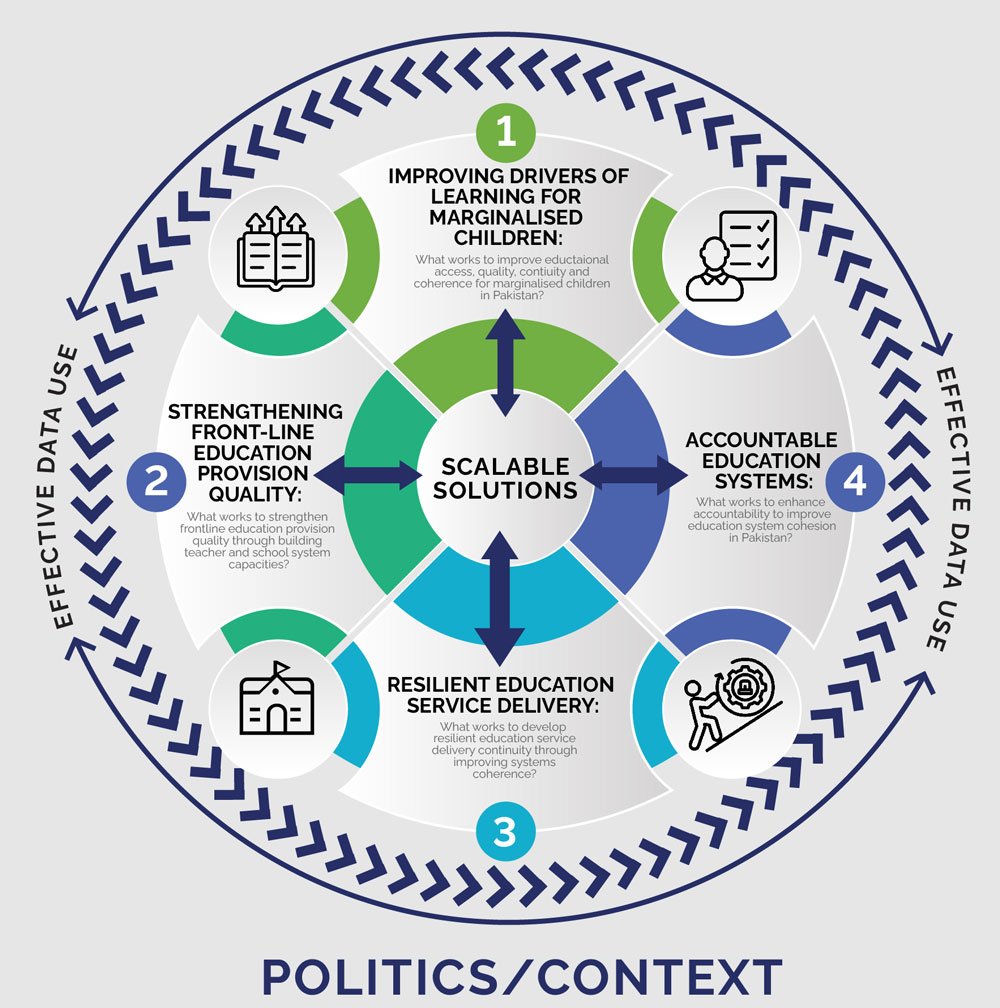
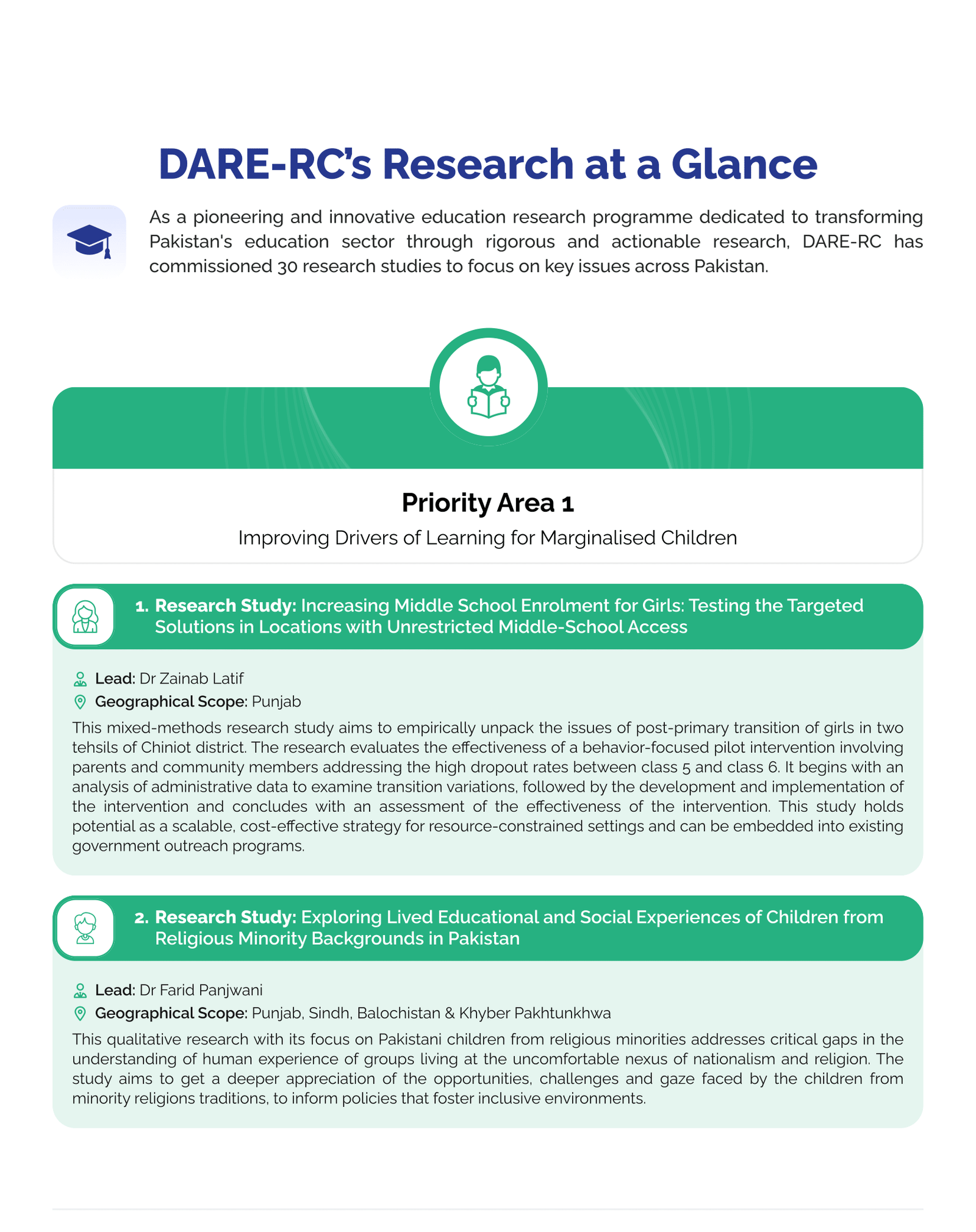
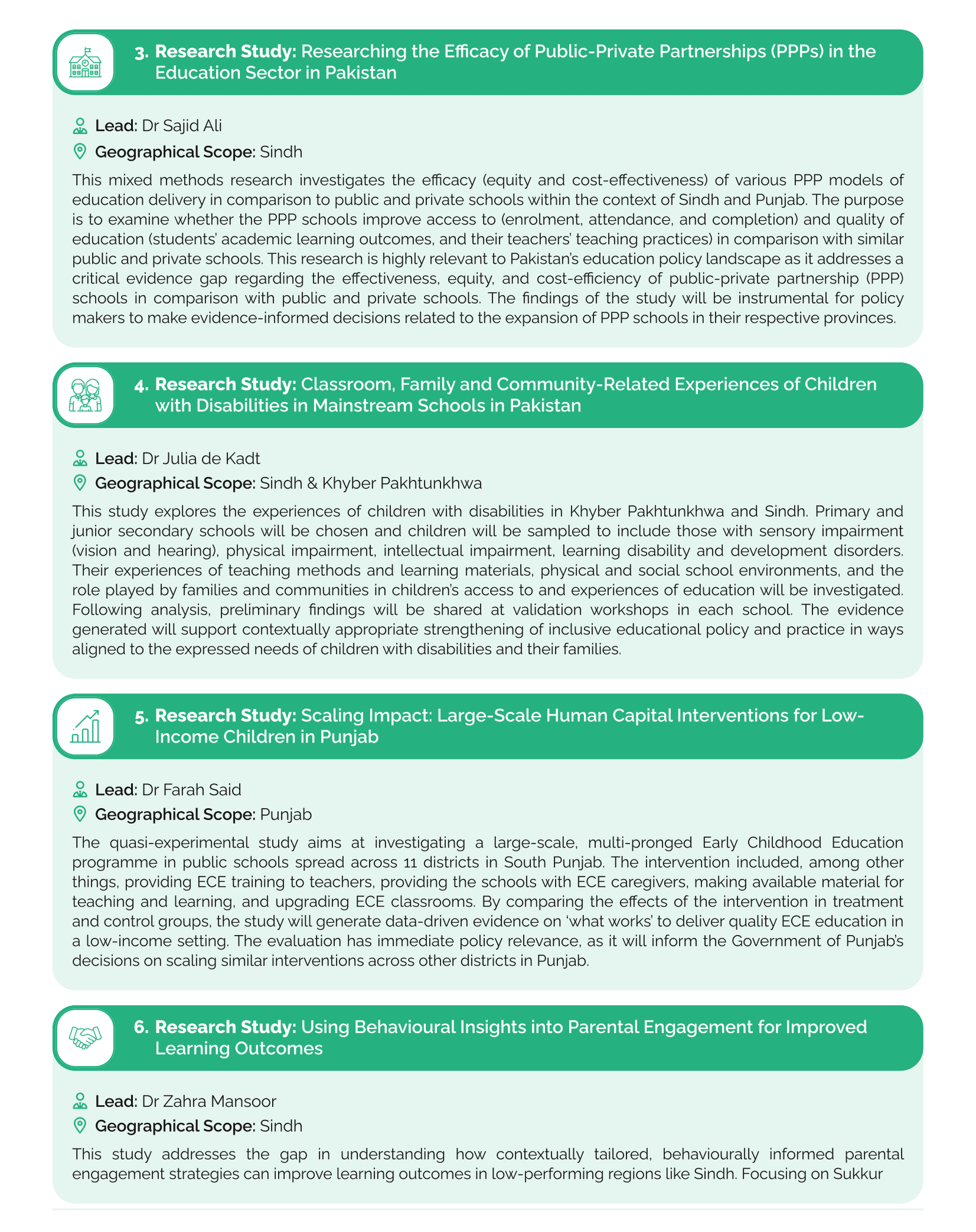
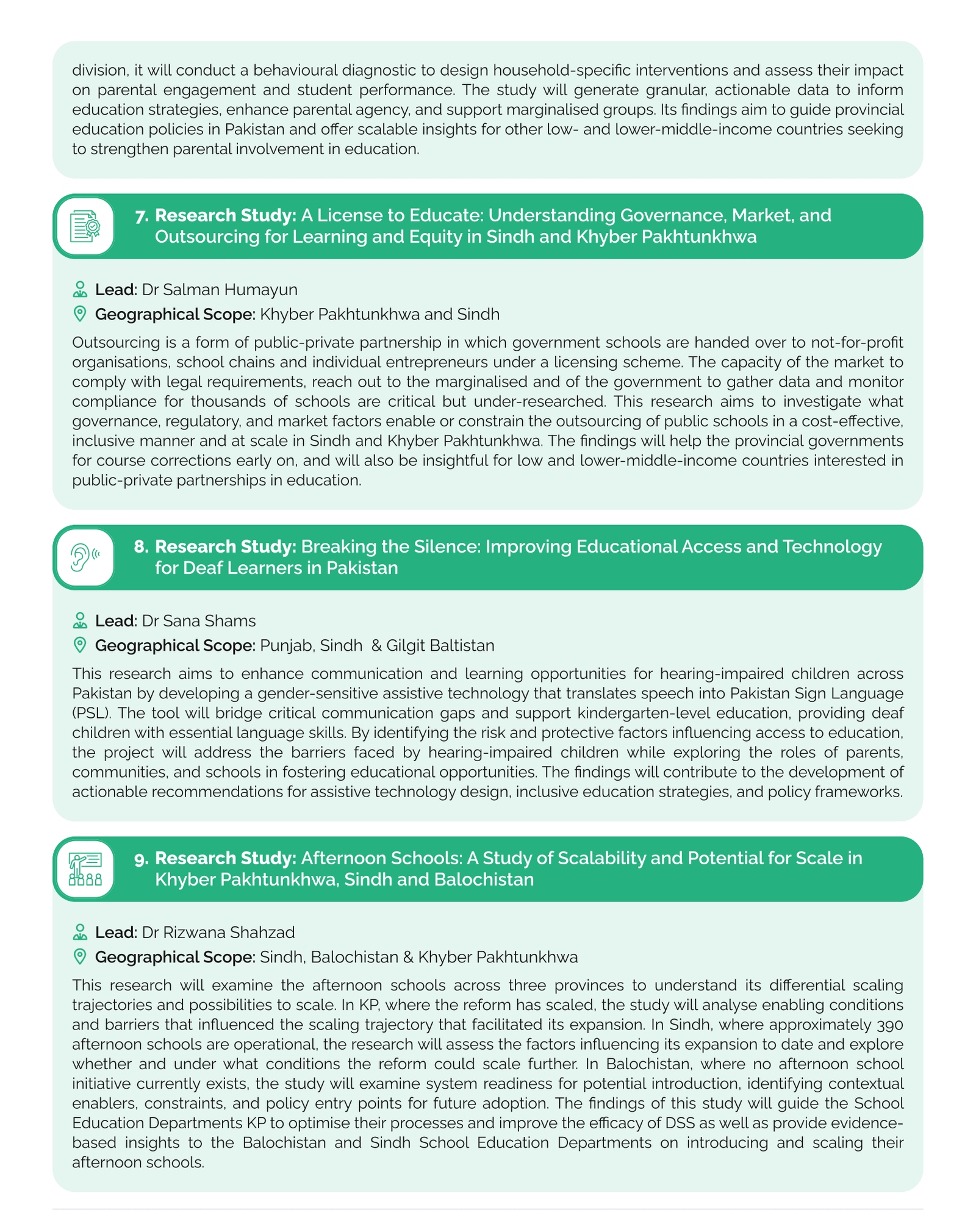
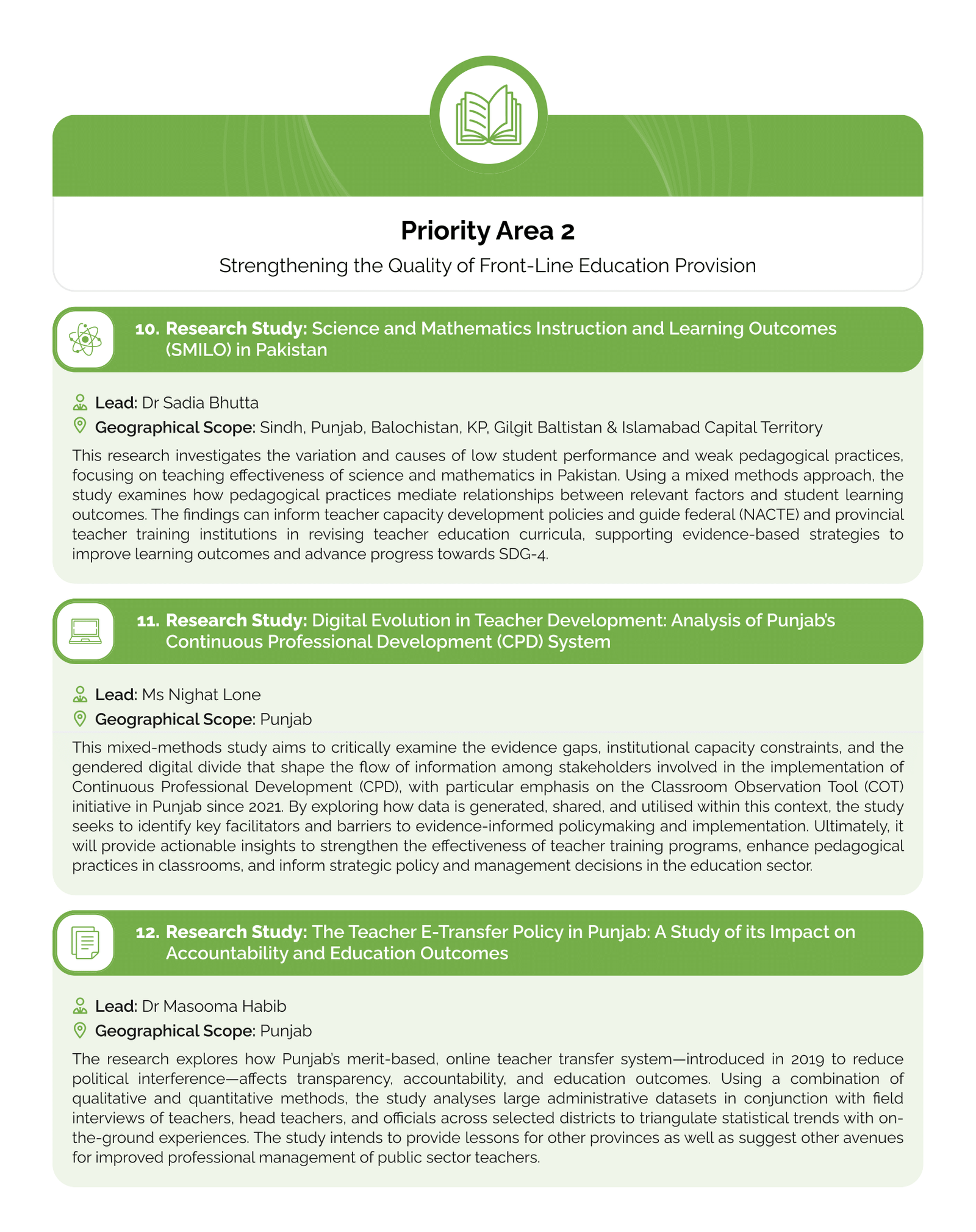
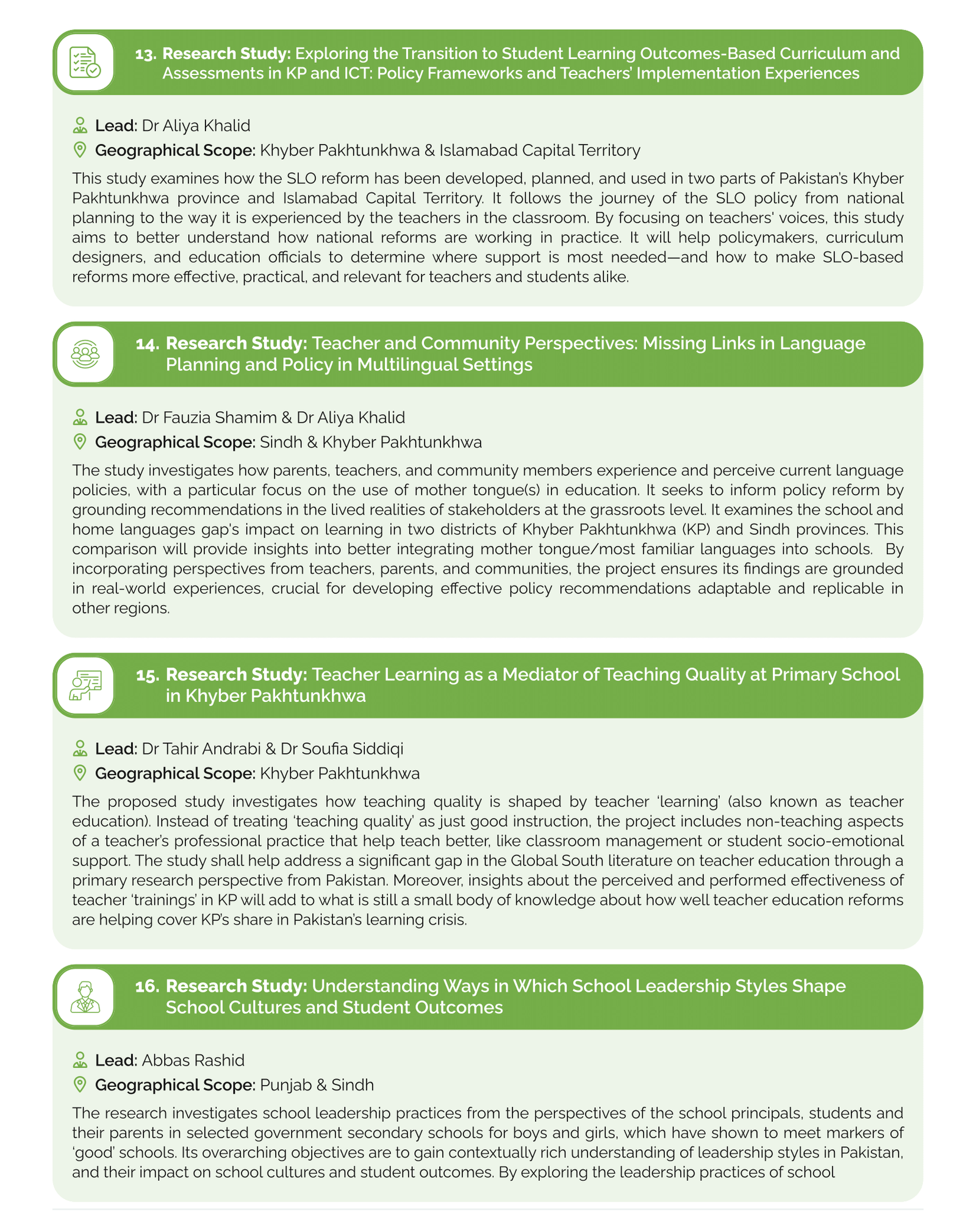
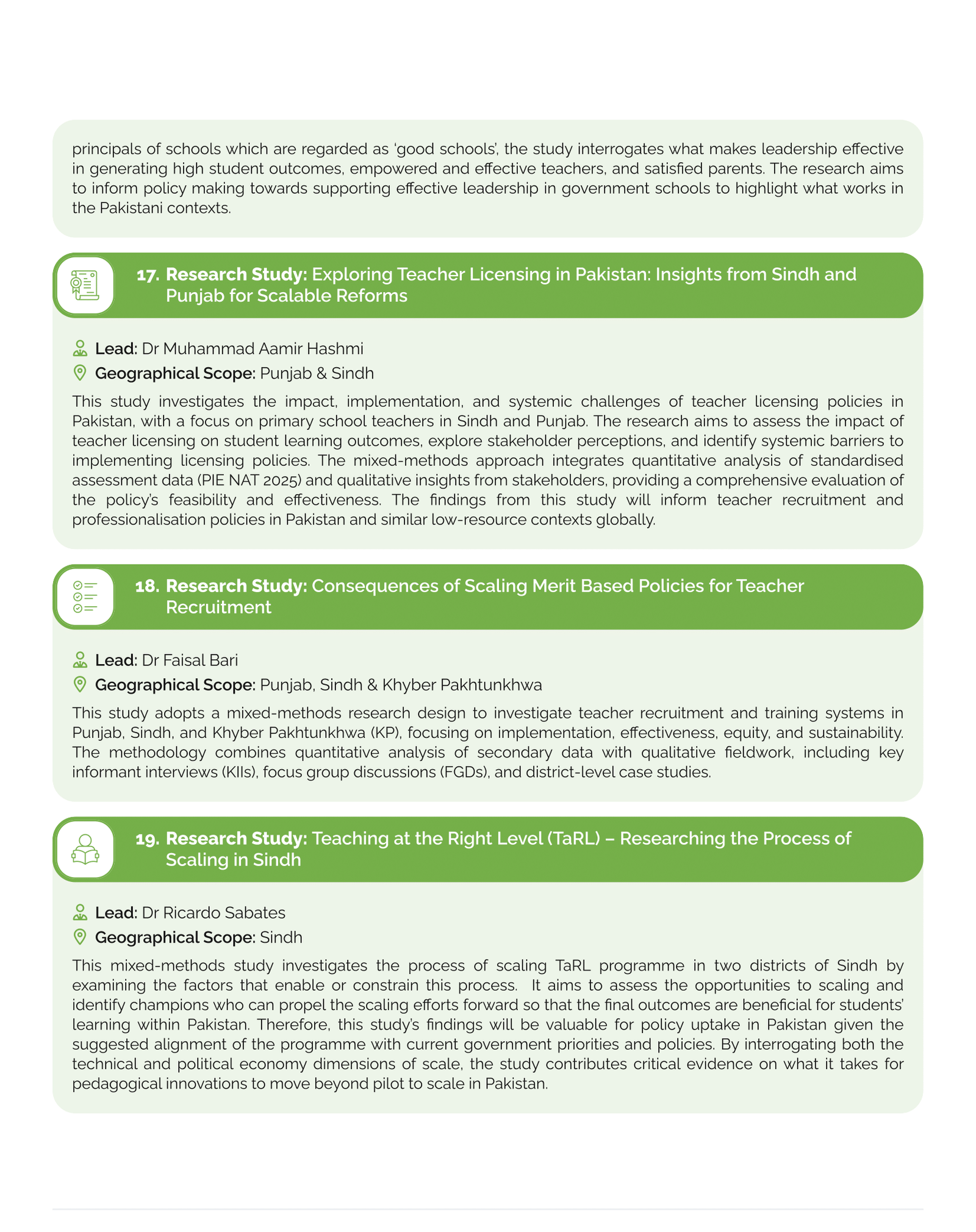
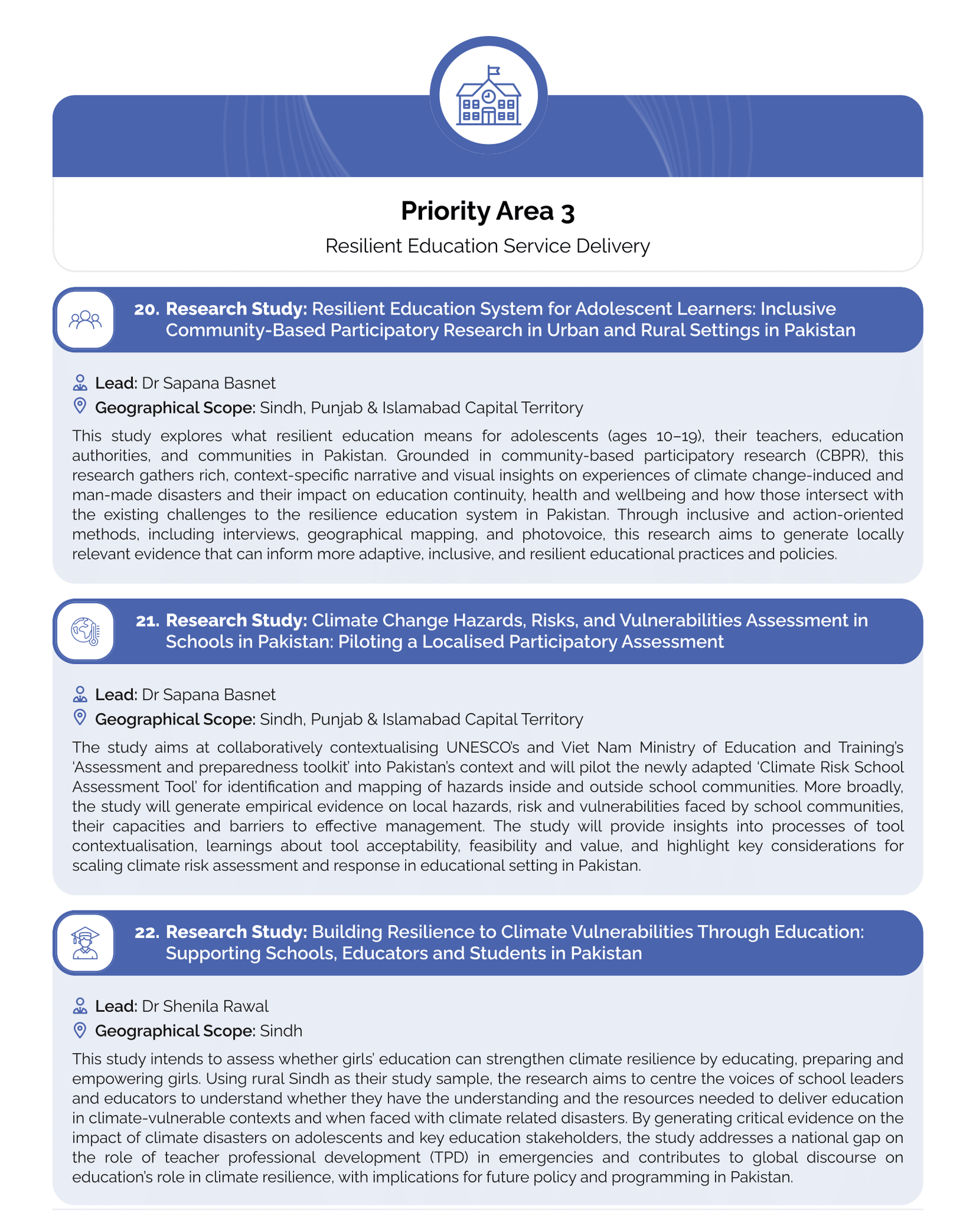
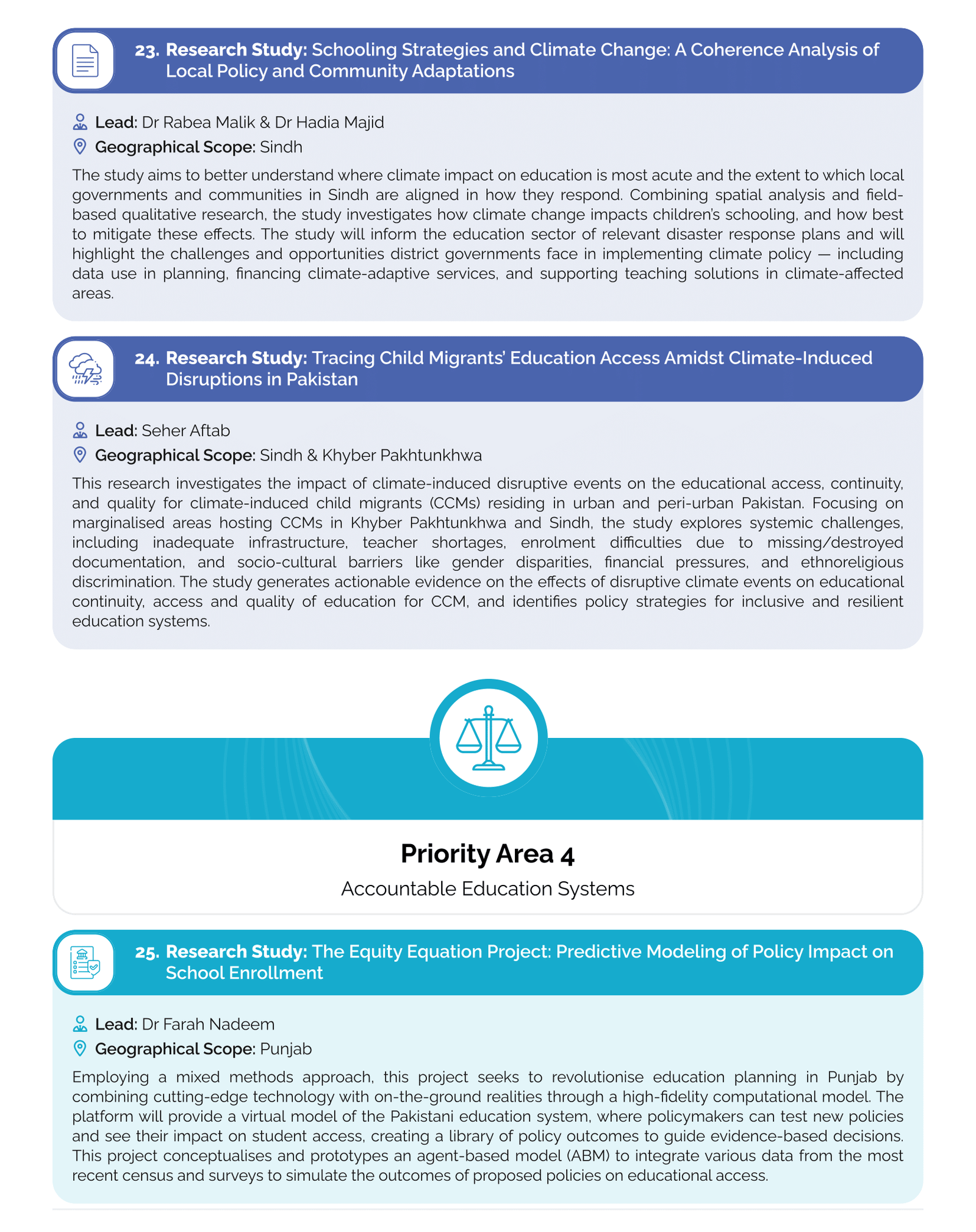
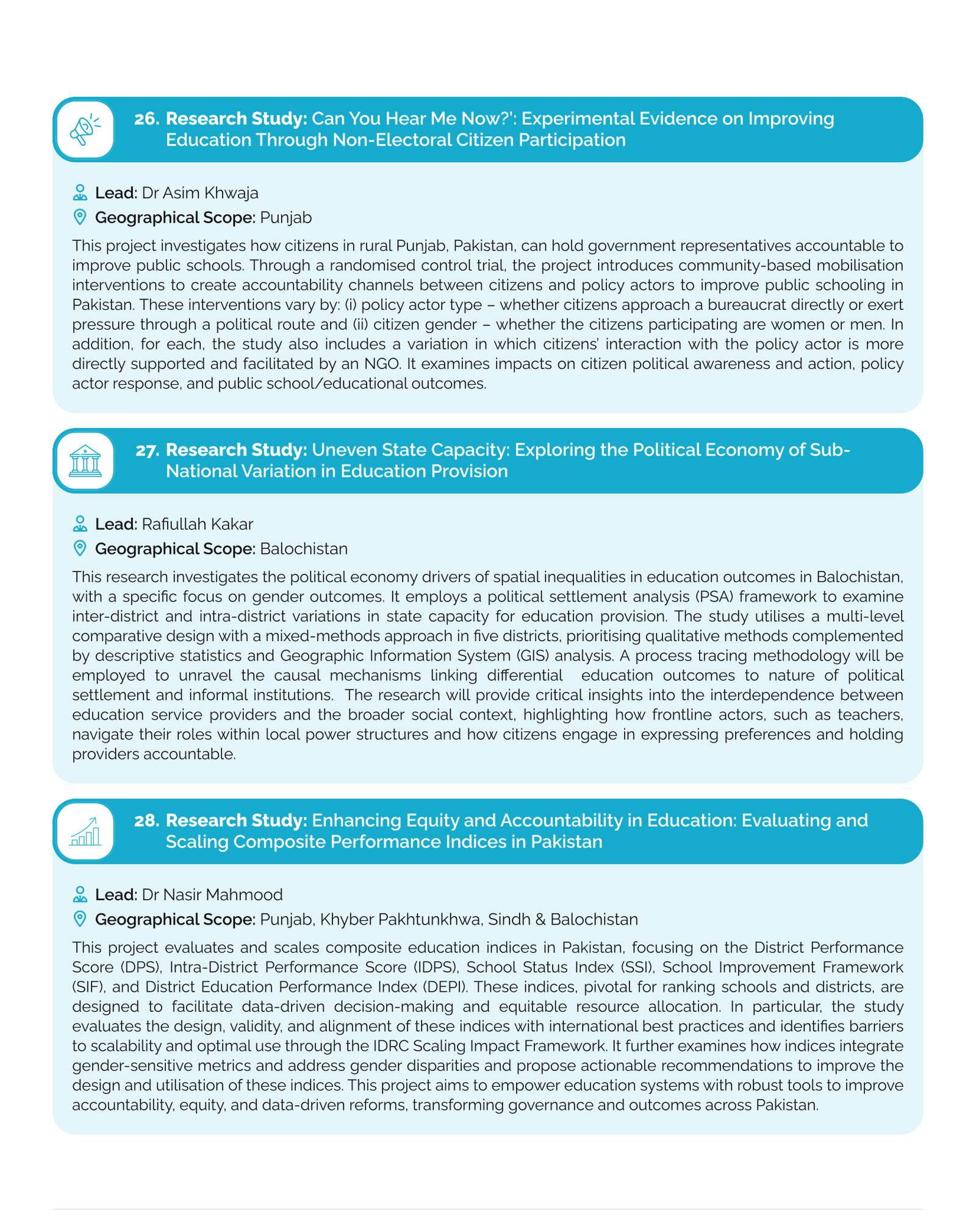
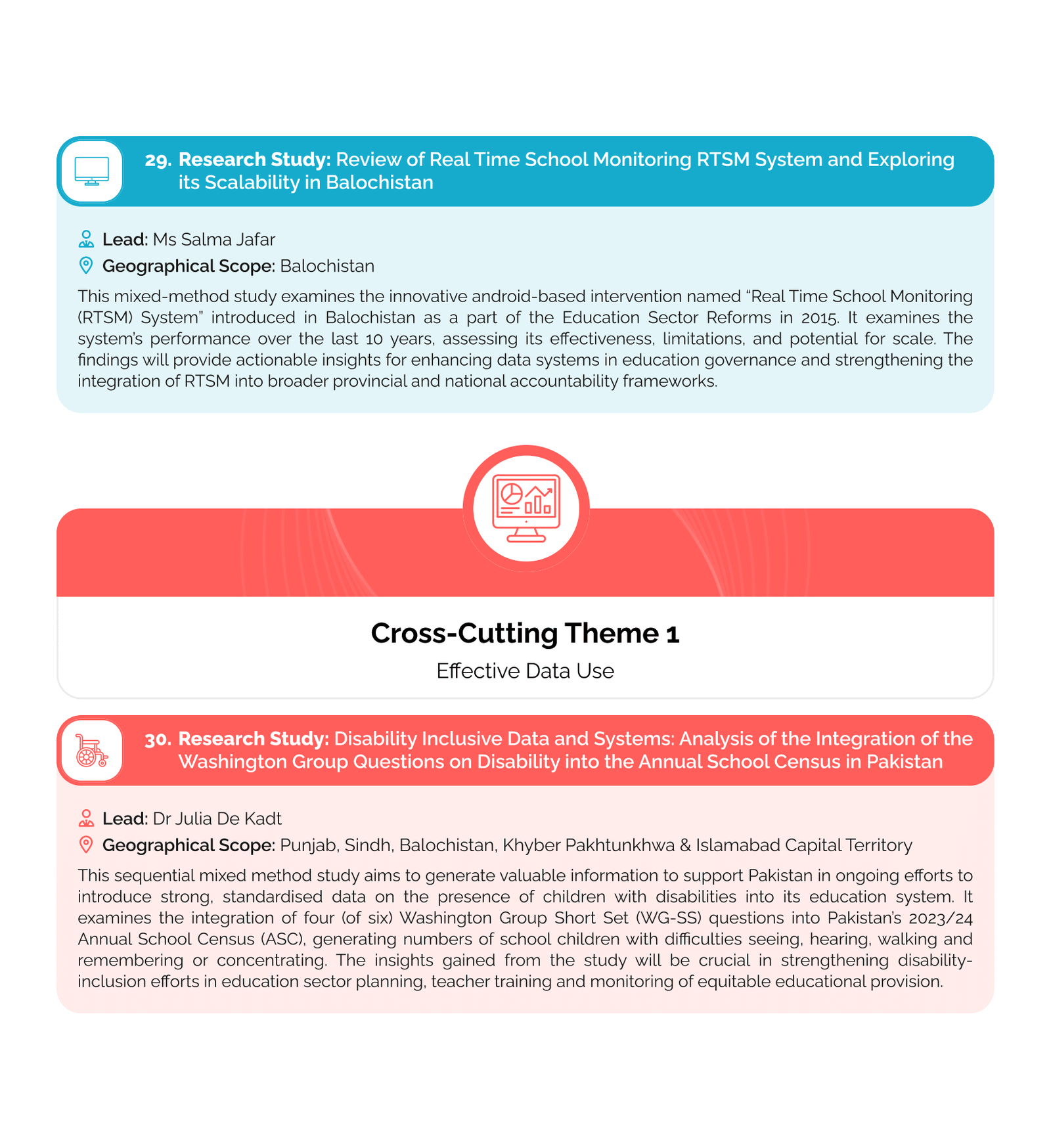

Inception

Data Collection

Analysis

Conclusion

Dissemination
Studies Commissioned by DARE-RC

Study Title: Disability inclusive data and systems: Analysis of the integration of the Washington Group Questions on Disability into the Annual School Census (ASC) in Pakistan.
Lead Researcher: Dr Julia De Kadt
Geographical Scope: Punjab, Sindh, Khyber Pakhtunkhwa, Balochistan & ICT
The mixed-methods study intends to inform improvements in disability data collection both nationally and globally, and eventually contribute to the development of standardized processes and guidance for disability data collection and use within educational systems. Study findings aim to strengthen the quality of disability disaggregated data in Pakistan leading to more informed planning and successful implementation of ESPs. This data will be crucial in strengthening disability-inclusion efforts in education sector planning, teacher training and monitoring of equity of educational provision.

Study Title:Resilient education system for adolescent learners: inclusive community-based participatory research in urban and rural settings in Pakistan.
Lead Researcher: Dr Sapana Basnet
Geographical Scope: Sindh, Punjab & ICT
This mixed methods study aims to investigate what resilient education systems mean to adolescent learners, their teachers, education authorities and communities in Pakistan, using Punjab, SIndh & ICT as study samples. Understanding these contextual experiences and how they are mediated through barriers and vulnerabilities related to climate change can directly feed into the policy and programmes related to localised resilient education systems.

Study Title: Exploring Lived Educational and Social Experiences of Children from Religious Minority Backgrounds in Pakistan.
Lead Researcher: Dr Farid Panjwani
Geographical Scope: Punjab, Sindh, Khyber Pakhtunkhwa & Balochistan
The proposed qualitative research with its focus on Pakistani children from religious minorities addresses critical gaps in our
understanding of human experience of groups living at the uncomfortable nexus of nationalism and religion. The study aims to get a deeper appreciation of the opportunities, challenges and gaze faced by the children from minority religions traditions, to inform policies that foster inclusive environments.

Study Title: Increasing Middle School Enrolment for Girls: Testing the Targeted Solutions in Locations with Unrestricted Middle-School Access.
Lead Researcher: Dr Zainab Latif
Geographical Scope: Punjab
The mixed methods study aims to empirically unpack the issues of post-primary transition of girls in Punjab. The research
evaluates the effectiveness of a pilot intervention aimed at addressing the high dropout rates between class 5 and class 6. It begins with an analysis of administrative data to examine transition variations, followed by the development and
implementation of a participatory intervention involving parents and community members, and concludes with an assessment of the effectiveness of the intervention.

Study Title: Digital Evolution in Teacher Development: Analysis of Punjab's Continuous Professional Development (CPD) System.
Lead Researcher: Ms Nighat Lone
Geographical Scope: Punjab
This mixed methods research will highlight the evidence gaps, capacity constraints, and the gender digital divide to identify
information that flows across stakeholders. This study will explore how data can support evidence-informed policy,
implementation, and management, offering actionable insights to enhance the efficiency of teacher training, improve
classroom practices, and contribute to informed policy decisions.

Study Title: The Comparative Study of Policymaking, Planning and Implementation of SLOs-Focused Teaching and Learning and Student Assessment in Schools of Khyber Pakhtunkhwa and ICT Schools.
Lead Researcher: Dr Nasir Jalil
Geographical Scope: ICT & Khyber Pakhtunkhwa
This mixed methods research will highlight the evidence gaps, capacity constraints, and the gender digital divide to identify
information that flows across stakeholders. This study will explore how data can support evidence-informed policy,
implementation, and management, offering actionable insights to enhance the efficiency of teacher training, improve
classroom practices, and contribute to informed policy decisions.The proposed mixed methods study seeks to identify the challenges faced in the implementation of policy and policy provisions of SLOs based curriculum for English and Math subjects for grade 9 and 10 level students. It aims
to assess whether the nuanced focus on SLOs-based teacher training, SLOs based classroom teaching and the SLOs based student external assessment help enhance students' achievement and improve quality education.

Study Title: Does the Teacher e-transfer Policy Improve Accountability and Learning Performance in Punjab’s Schools?
Lead Researcher: Dr Masooma Habib
Geographical Scope:Punjab
The mixed methods study aims to assess if the teacher e-Transfer policy reform has been successful in achieving its objectives
of better transparency and accountability in teacher allocation and better education outcomes for all students due to greater
teacher satisfaction and efficient distribution across regions. The study intends to provide lessons for other provinces as well as suggest other avenues for improved professional management of public sector teachers.

Study Title: Classroom, family and community-related experiences of children with disabilities in mainstream schools in Pakistan.
Lead Researcher: Dr Julia De Kadt
Geographical Scope: Khyber Pakhtunkhwa & Sindh
This qualitative study explores the experiences of children with disabilities in Khyber Pakhtunkhwa and Sindh.
Using participatory approaches, experiences of teaching methods and learning materials, physical and social
school environments, and the role played by families and communities in children’s access to and experiences of
education will be investigated to strengthen delivery of inclusive education.

Study Title: Climate change hazards, risks, and vulnerabilities assessment in schools in Pakistan: piloting a localised participatory assessment.
Lead Researcher: Dr Sapana Basnet
Geographical Scope:Punjab & ICT
This Action Oriented Participatory Implementation Research aims to contextualize UNESCO’s ‘Assessment and preparedness toolkit’ into Pakistan’s context. Piloting the newly adapted ‘Climate Risk School Assessment Tool’ in Punjab and ICT, for identification and mapping of hazards inside and outside school communities. The study will provide insights into processes of tool contextualisation, learnings about tool acceptability, feasibility and value, and highlight key considerations for scaling
climate risk assessment in educational settings in Pakistan.

Study Title: Researching the effectiveness of Public-Private Partnerships (PPPs) in the Education Sector in Pakistan.
Lead Researcher: Dr Sajid Ali
Geographical Scope: Punjab & Sindh
Employing a mixed methods approach, this research explores the efficacy of PPPs in education in comparison to public and
private schools within the context of Sindh and Punjab provinces of Pakistan. The purpose is to examine whether the PPP
schools improve access to (in terms of enrolment, attendance, and completion) and quality of education (in terms of students’ academic learning outcomes, and their teachers’ teaching practices) in comparison with similar public and private schools.

Study Title: Science and Mathematics Instruction and Learning Outcomes (SMILO) in Pakistan.
Lead Researcher: Dr Sadia Bhutta
Geographical Scope: Punjab, Sindh, Khyber Pakhtunkhwa, Balochistan & ICT
This research intends to investigate the variation and causes of low student performance and weak pedagogical practices, focusing on teaching effectiveness of science and mathematics in Pakistan. Using a mixed methods approach, the study will examine how pedagogical practices mediate relationships between relevant factors and student learning outcomes. Additionally, the research will explore teachers' voices regarding participatory pedagogy with the aim to provide valuable insights for policymakers and practitioners to improve teaching quality and students' learning in science and mathematics.

Study Title: Girls’ Education and Climate Change – Building Resilience to Vulnerabilities through Education.
Lead Researcher: Dr Shenila Rawal
Geographical Scope: Sindh
This study intends to assess whether girls’ education can strengthen climate resilience by educating, preparing and
empowering girls. Using Sindh as their study sample, the research aims to centre the voices of school leaders and educators
to understand whether they have the understanding and the resources needed to deliver education in climate-vulnerable
contexts and when faced with climate related disasters

Study Title: The equity Education Project – Modeling of policy impact on school enrollment.
Lead Researcher: Dr Farah Nadeem
Geographical Scope: Punjab
Employing a mixed methods approach, this project seeks to revolutionize education planning in Punjab by combining
cutting-edge technology with on-the-ground realities through a high-fidelity computational model. The platform will provide a virtual model of the Pakistani education system, where policymakers can test new policies and see their impact on student access, creating a library of policy outcomes to guide evidence-based decisions. This project conceptualizes and prototypes an agent-based model (ABM) to integrate various data from the most recent census and surveys to simulate the outcomes of proposed policies on educational access.

Study Title: Teacher and Community Perspectives: Missing links in Language Planning and Policy in Multilingual Settings.
Lead Researcher: Dr Fauzia Shamim
Geographical Scope: Khyber Pakhtunkhwa and Sindh
This qualitative research posits that the language of instruction (LoI) is crucial for effective learning in multilingual classrooms. This study examines this gap's impact on learning in two districts of Khyber Pakhtunkhwa (KP) and Sindh provinces. This comparison will provide insights into better integrating mother tongue/most familiar languages into schools, bridging the school-home language gap, leading to improved learning outcomes.

Study Title: Schooling Strategies and Climate Change: A Coherence Analysis of local policy & Community Adaptations.
Lead Researcher: Dr Rabea Malik
Geographical Scope: Punjab and Sindh
The problem that the study shall address is that the disruption caused by extreme climate events (namely flooding, heatwaves, and air pollution) in Pakistan is far from evenly felt across the country. It aims to better understand where climate impact on education is most acute and the extent to which local governments and communities in Punjab & Sindh are aligned in how they respond. Combining spatial analysis and field-based qualitative research, the study investigates how climate change impacts children’s schooling, and how best to mitigate these effects.

Study Title: Teacher Learning as a Mediator of Teaching Quality at Primary School in Khyber Pakhtunkhwa.
Lead Researcher: Dr Tahir Andrabi
Geographical Scope: Khyber Pakhtunkhwa
The proposed mixed methods study investigates how teaching quality is shaped by teacher ‘learning’ (also known as teacher education). Learning here refers to formal and informal ways in which teachers build capacity to perform in a resource-constrained public primary school system like Pakistan. Simultaneously, insights about the perceived and performed effectiveness of teacher ‘trainings’ in KP will add to what is still a small body of knowledge about how well teacher education reforms are helping cover KP’s share in Pakistan’s learning crisis.





